Making the Invisible, Visible
A Portland Class on Ignorance, Race, and Bias
Written by: Namdrol Miranda Adams
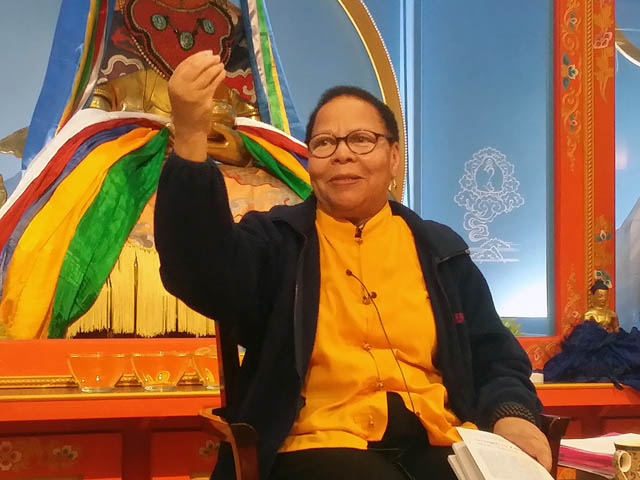
Jan Willis brings vigor into her teaching on race and racism.
Photos by: Leigh Miller
Division by race continues to be an issue in the evolution of the dharma in the West, leading a noted scholar and dharma teacher to take on the subject for a course this recent autumn.
The course, at Maitripa College in Portland, was called: “Making the Invisible, Visible: The Other Side of ‘Perfect’: A Multi-media and Interactive Exploration of Race and Racism in the U.S.”
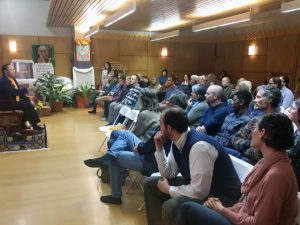
The class was rapt during the month-long series.
It was led by Dr. Jan Willis, a noted Buddhist studies scholar, professor emerita of religion at Wesleyan University, and visiting professor at Agnes Scott College in Decatur, Georgia. Willis has been a student of Tibetan Buddhism for over 40 years, and is a longtime friend to Maitripa.
The intention of the course was, in the safety and sanctity of a Buddhist environment, to explore the deep and troubling issues of race and racism in our country and in our lives. The course explored such questions as: “How does Buddhism help us to recognize our biases?” and “How does it provide meaningful solutions?”
Course objectives included giving students foundational knowledge in basic, relevant Buddhist terms and concepts such as dependent origination, the three wisdoms, bodhicitta, and equanimity. Also included was information on race theory and views, from major thinkers in the field.
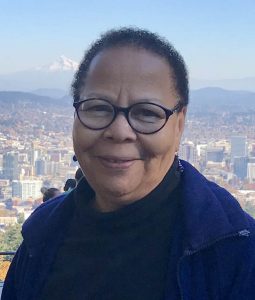
Willis brings her deep dharma practice into her teaching.
The class included an introspective aspect, in which meditation and contemplative practices were introduced as tools for students’ own lives. These techniques for self-understanding helped them develop insight into their own and others’ identities and perceptions.
The class also dedicated time to discussion about issues of social inequality, and its representation in popular media.
Course materials were drawn from a variety of sources, including contemporary film and documentary, rap and folk music, multimedia coverage of current events, comedy, historical research, and selected readings from memoirs and critical race theory.
Under the skillful guidance of Professor Willis, the class of 17 students met three times a week for most of October, alternating lectures, discussion of the course materials, and conversation, with exercises and guided meditations for recognizing and working with bias. During the course the students deeply heard the stories and experiences of others.
A constant refrain in class was the mantra “get proximate,” which was an encouragement to remain present, and to open one’s mind and awareness to the situation and experience of race and bias in our lives and world.
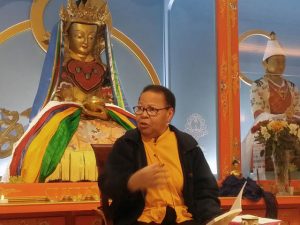
Willis makes a point during her class series.
The class was a glorious, poignant, and heart-wrenching journey into the relevant issue of the role of race, privilege, and bias in our culture, our communities, and our lives, today and in our recent past.
On the microscopic level it was an opportunity to look directly at our own particular roles in perpetuating the suffering of racism individually, and as communities and cultures. On the macroscopic level it was an opportunity to see samsara in action and as it truly exists: a constructed reality based on and perpetuated by ignorance, and consistently nurtured by hatred, attachment, and fear.
The course was rooted in the context of the historical Buddha.
In his time the historical Buddha was famous for accepting into his community of spiritual practitioners students born into unfortunate circumstances and into low castes, as well as women. He was also famous for his teachings on loving-kindness, compassion, and the essential perfection of every living being’s mind.
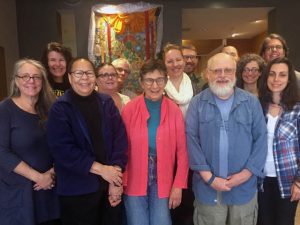
Willis and students gather for a final photo.
It is difficult to see how biased communities could grow out of a tradition that posits equanimity as the basis upon which many other spiritual qualities are cultivated; undiscriminating, egoless compassion as the perfect method by which to practice; and Buddha-nature in every being as the core of potential for perfect Buddhahood.
However it is a fact that the vast majority of Western (non-Asian) Buddhist communities in the United States are predominantly white and middle-class. It is also a fact that, for the most part, they are filled with well-educated, well-intentioned people who have no conscious wish to reproduce the broad injustices of American society (especially in terms of race and class) in their spiritual families.
And yet despite ourselves we see similar social stratifications occurring. What to do? How to deal?
The course experience was moving and transformative, and Dr. Willis displayed admirable courage and fortitude in guiding a group of eager and engaged students along a path of often-challenging self-inquiry and self-discovery, with a desire to act in service of positive change. The course ended with a gentle reminder of our own Buddha nature, and our inherent goodness.
Here are some suggestions for immediate actions that Professor Willis left the class with:
- Listen to progressive radio (PBS, NPR, BBC)
- Visit African-American sections in bookstores
- Go to ethnically-inspired museums
- Volunteer at homeless shelters, food pantries, kitchens
- Create or contribute to an online public resource center webpage
- Become an ally by understanding the other
- Learn about and follow #BlackLivesMatter and #SayHerName
Maitripa College remains committed to its mission of offering contemplative learning founded upon three pillars of scholarship, meditation, and service. The school serves our students, and the region, through diverse and relevant educational, religious and community programs such as these.
Maitripa College plans to continue this series in the coming years with courses that focus on other aspects of bias in society such as class and gender. These arise from ignorance and illustrate how we create and perpetuate samsara in our world, and why we must free ourselves from ignorance. Please watch our website at www.maitripa.org for details about these upcoming programs.
